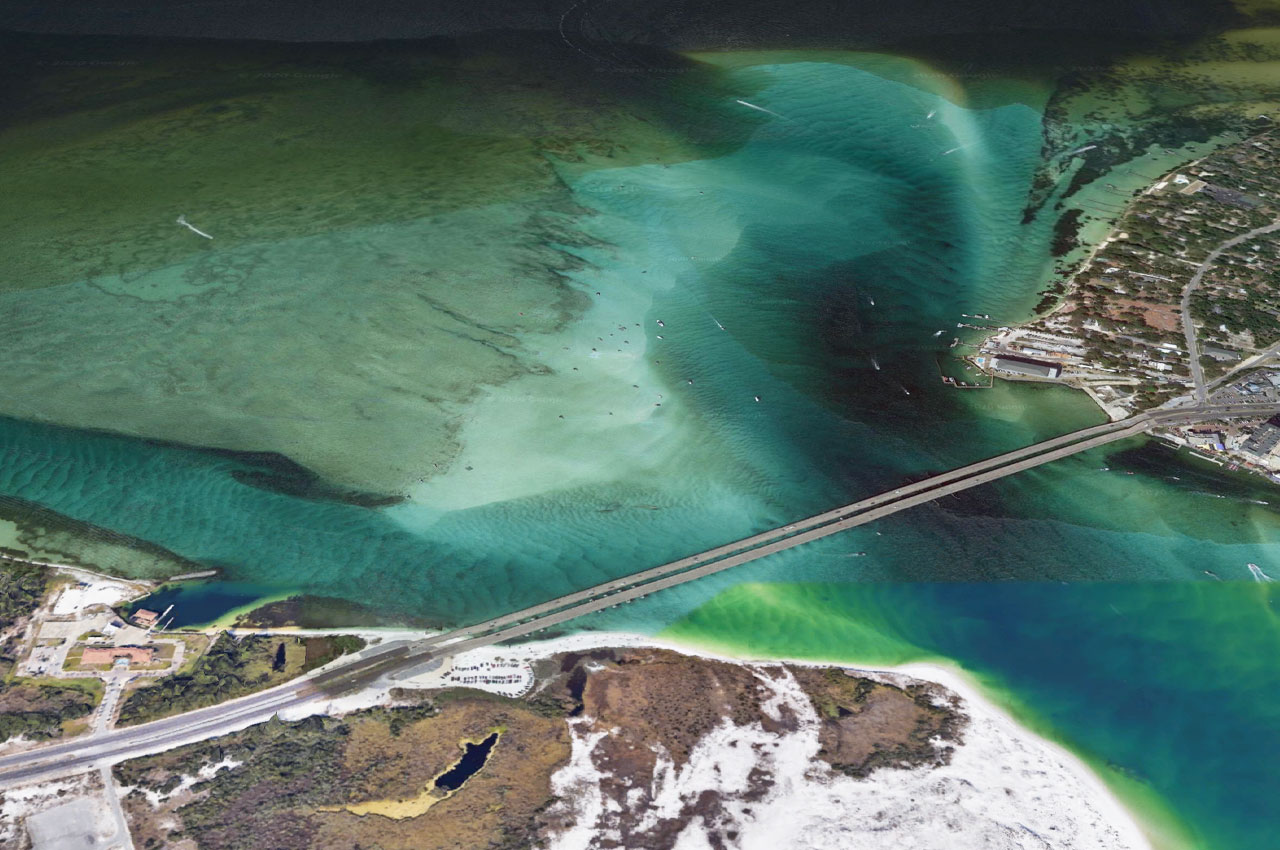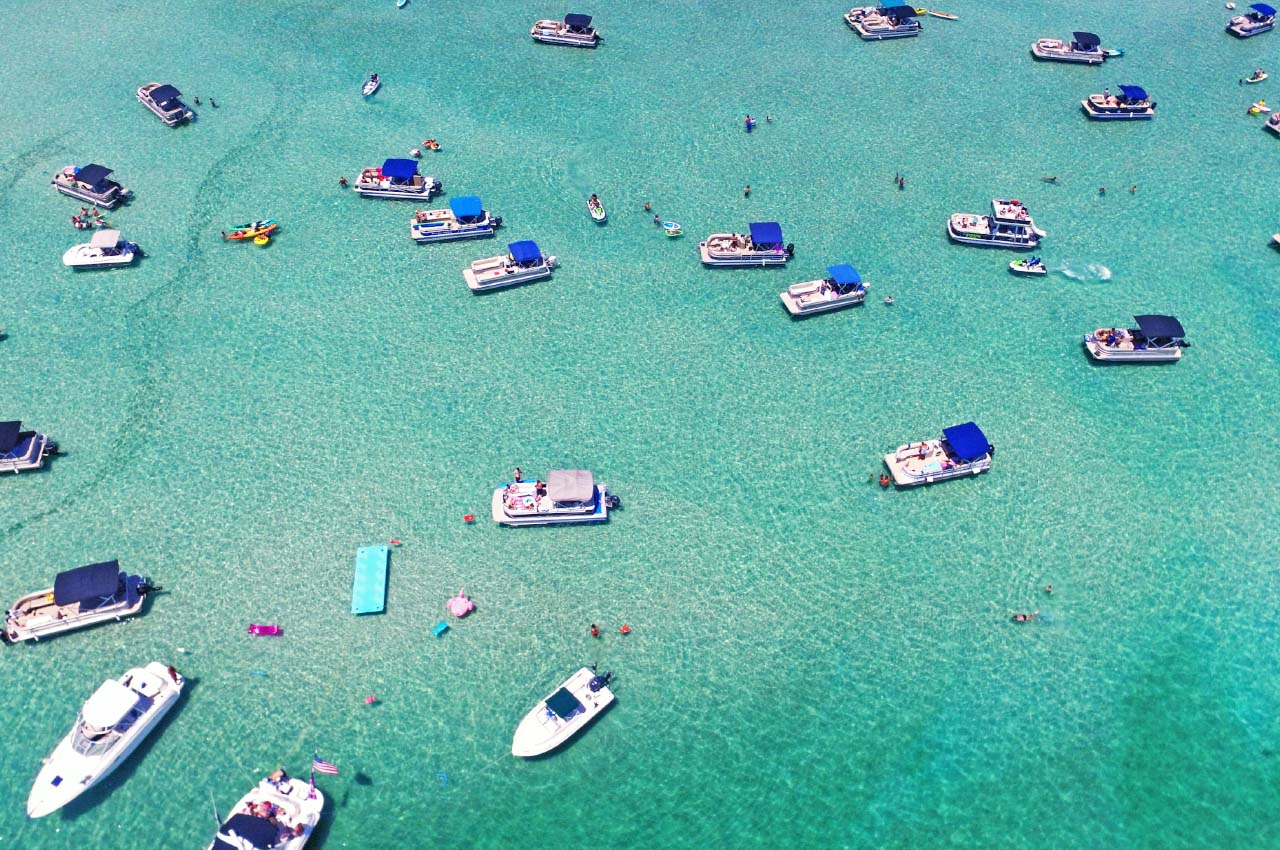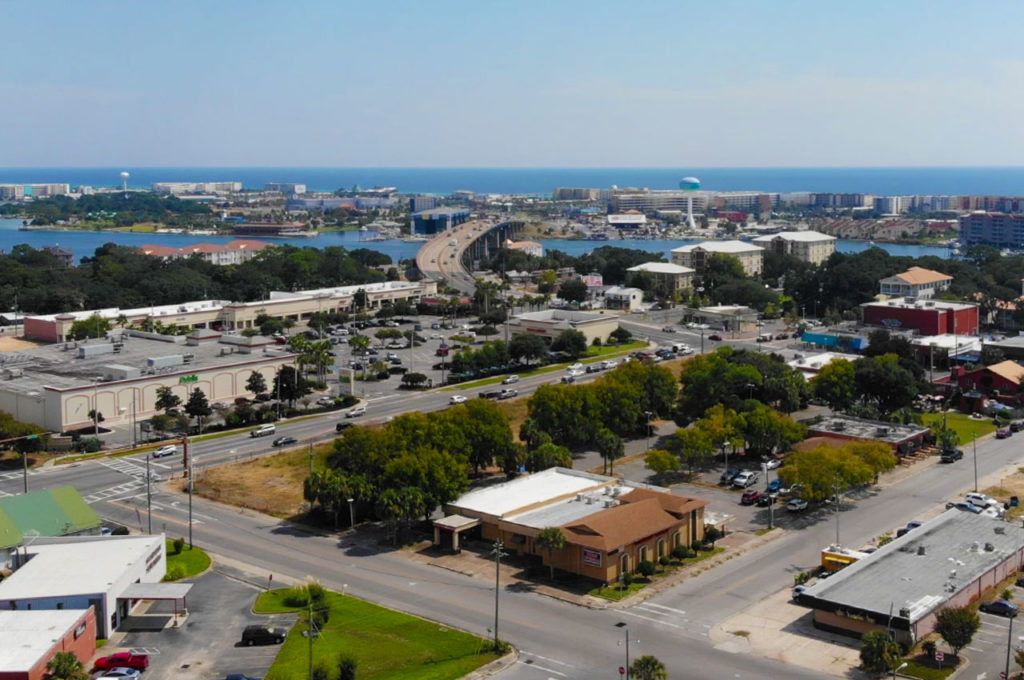Crab Island, located north of the Destin bridge, has long been a destination for boaters, both locals and tourists. Over the years, a bustling scene of roving vendors selling food, drinks and souvenirs has sprung up on the shallow waters of the submerged sandbar.
- However, this lively mix of small businesses may face an uncertain future due to an upcoming change from the National Park Service (NPS).
The NPS, which claims jurisdiction over Crab Island as part of the Gulf Islands National Seashore, is currently developing a Commercial Services Strategy and Environmental Assessment that could overhaul how vendors are allowed to operate in the area, and what services or goods would be permitted.
In an interview with WEAR Channel 3, Congressman Matt Gaetz and Destin Mayor Bobby Wagner both voiced strong opposition to the “proposed” changes, arguing that the plan could be detrimental to the local vendors and pose safety risks to visitors.
In their interview at Crab Island, Gaetz said that under the NPS strategy, at least 88 independent vendors could be replaced by a single concessionaire contract. While vendors would still be permitted to operate, many would likely have to move from the shallow inner sandbar to deeper waters along the perimeter, outside of the Crab Island zone.
- Gaetz and Wagner have cautioned that this relocation could endanger visitors due to the stronger currents and uneven depths of the outer waters. He said the change could lead to more drowning incidents.
Mayor Wagner says that switching to a single contracted vendor would harm the diversity of businesses at Crab Island. He emphasized the importance of the small, family-run operations that have made Crab Island a beloved destination for residents and tourists alike.
Congressman Matt Gaetz voiced these concerns in a letter to the Department of the Interior, asking them to reconsider the NPS plan. He said management of the vendors should remain in local hands rather than being dictated by federal oversight.
- Mayor Wagner echoed many of Gaetz’s criticisms, arguing that Crab Island has been successfully self-regulated by the city and county along with the vendors themselves.
In an interview, Wagner said Crab Island has evolved into a major economic engine for the area, attracting droves of visitors who patronize the floating restaurants, souvenir shops and activity rental businesses.
He believes this commercial activity is best managed collaboratively by the local municipalities and vendors who know the area best. Wagner criticized the federal government for interfering with a system that was already working well under local oversight.
The Mayor worries that switching to a single NPS concessionaire contract would dramatically alter the special ambiance of Crab Island.
- Wagner said many vendors have built livelihoods and supported families for years through their Crab Island ventures. He said they now fear losing everything if the NPS plan goes through.
“Local government should hold the power to manage and maintain our natural resources and businesses. I do not wish to give up regional control to the federal government so that they can tell us ‘what is best’,” he said. “If we allow government overreach to continue, we give up the privilege to self-govern and lose our local voice and freedom.”
In a resolution passed on August 21, 2023, the Destin City Council formally aligned themselves with Gaetz in opposing unilateral federal control over Crab Island vendors. The council emphasized that any changes should be made collaboratively with local input.
The resolution states “the City of Destin and Okaloosa County are privileged to have the Crab Island Area, a significant recreational hub that has attracted countless visitors, promoting local diversity and economic progress.” It goes on to say safety and commerce at Crab Island are best managed by the local community.
Crab Island is part of a national park
NPS Superintendent Darrell Echols confirmed in an interview that under federal law, the National Park Service has jurisdiction over commercial activities within national parks. He said the upcoming Commercial Services Strategy will follow mandated policies for concessions management.
He explained that under the 1998 Concessions Management Improvement Act,commercial activities in national parks must go through an extensive approval process. The NPS evaluates whether proposed ventures are “necessary and appropriate” for each park’s specific nature and purpose.
For small operations making under $25,000 annually, parks can issue Commercial Use Authorizations (CUAs). However, for larger concessions making over $25,000, the NPS must conduct a competitive bidding process for concessions contracts.

This contract bidding process involves first developing a detailed “prospectus” outlining the services to be offered. The prospectus is then put out publicly for 60-90 days for companies to place bids. A national NPS panel evaluates the proposals, with final approval either regionally or from the Washington office.
Echols stressed that the NPS has no choice but to follow these mandated policiesfor larger concessions operations in national parks. However, he said they are trying to balance public input as they finalize the Crab Island strategy.
Echols said the NPS has flexibility in terms of the geographic scope and services covered in a concessions contract. For instance, they could potentially allow some services under a concessionaire and others under CUAs.
- But he emphasized that the NPS cannot permit commercial activities that are not deemed “necessary and appropriate” under their guidelines. This legal obligation limits how much the Crab Island strategy can be tailored based on public feedback.
When it comes to the “necessary and appropriate” criteria, Echols explained that selling bottled water isn’t necessary for the public to enjoy the park or to preserve the natural and cultural resources in the park. However, in contrast, something like a snorkel tour, is designed to bring the public to the park in a way that they wouldn’t be able to see or experience without a tour. He says that would be considered necessary because it furthers the purpose of the park.
He went on to say that if a business meets all the appropriate criteria, it would then be determined to be appropriate. And so, if a commercial venture can be determined to be necessary and appropriate, it could be something that the park would entertain allowing.
- If it’s not necessary or not appropriate, then NPS would not, by law, be able to allow it, according to Echols.
Next steps
Once finished, the EA and CSS will determine the allowed visitor uses and commercial services at Crab Island going forward. As it stands currently, the NPS’ management zones for Crab Island do not match the existing activities, which include watersport rentals, dining cruises, snorkeling trips and more. Updating the zones could open the door for more diverse visitor opportunities and commercial services.
While many may not realize it, the NPS boundary extends well beyond just Crab Island, encompassing surrounding waters including Navarre Beach, Pensacola Beach and Perdido Key, and areas of Mississippi. Any commercial services operating in these waters fall under NPS jurisdiction and management rules.
While the outcome remains uncertain at this point, Echols reiterated that the NPS has been transparent about the developing strategy with vendors and local officials. He said they aim to properly balance conservation, recreation access and appropriate concessions per their mandate as a federal agency.
- The superintendent said once the draft plan is released, there will be a 30 day public comment period, likely including a public meeting to outline details. The NPS will then make a final decision on the strategy.
Echols said they had hoped to finalize the plan by late summer, but it is now likely to drag into December or January. This could push implementation from 2024 to 2025, as vendors apply for new permits each January, but nothing is set as of yet.
While emphasizing the federal mandate to properly manage concessions contracts, Echols said the NPS is very committed in completing the strategy that they have been working on for 5 years.
- He went on to say that NPS has repeatedly been in contact with vendors over the past five years that changes are coming, and to not make any drastic changes to their businesses.
- They have also briefed all relevant local and federal officials on the plan over the past year.
The NPS insists their priority is protecting natural resources while providing appropriate public enjoyment. But many local leaders and businesses fear the federal approach could jeopardize the special character and economic livelihood of one of Destin’s most iconic attractions.
The heated debate over Crab Island concessions will likely continue as the Park Service moves forward with finalizing its strategy in the coming months.




10 Responses
The way Crab Island is now it’s become an overcrowded, dangerous toilet bowl. A lot of the boats there are rentals with people using them with no boating knowledge and causing accidents and injuries.
Bring it back to how it was years ago without all of the commercialism!! If you forgot sunscreen, water, etc, pack better.
You will never be able to bring it back to the way it was when there was actual land there. This new rule only applies to those selling products such as the pineapples, burgers, floats etc. Boat rentals will still be allowed to go there. this is just government realizing they are missing out on a income and taking advantage of same.
the federal government will screw this up. Gaetz will just go through the motions & talk a big game but he won’t get anything done.
Usually I would agree that less government interference is best, however this is an instance where protection of natural environment and preservation of quality requires regulation. Federal parks are not trashy! The NPS has the correct guidelines to ensure that Crab Island remains safe and desirable. Commercial exploitation does not improve the experience. People are capable of planning their own food and drinks; that is part of the boating experience. It is a good thing the federal government will protect this area’s sea grass which is vital for sea creatures and to maintain the beauty of Crab Island for those who love and respect nature.
How do you protect a “natural environment” that’s man made? I’m seriously curious. Crab island isn’t natural. It was created because they had to put sand from dredging the channel somewhere. And all this would do is stop the 80 something businesses that sell food and drinks to people visiting crab island from running their businesses. They aren’t the problem. The problem are drunk vacationers renting boats which would be unaffected by these changes. I live here and paddle board out to crab island all the time. The vendors aren’t unsafe and they aren’t the ones dropping garbage in the water or running people over.
Crab Island isn’t man made. It was created by a hurricane. when another hurricane comes through that area it may take it away. So, enjoy it while u can.
Ditto to CJ and Nancy’s comments. In addition to their points, the brawl ring that Crab Island has become, as evidenced by multiple news coverages over fighting in the water there, is likely sourced from people who have no business being out there to begin with. And if you can’t swim and are subject to increased risk of drowning from vendors placed in deeper water…take swim lessons or wear a ,if jacket! Furthermore, no one should be operating a boat until after passing a full week long boating safety and licensing course like we used to have to do around here 40 years ago. Maybe that will cut down on the number of accidents, fights, and drownings as tourists who have never been on multiple currents body of water will be required to become educated before they come down here and rent a cheap pontoon from a cheap vendor. It is clear that local vendors, and also law enforcement agencies are completely inept at managing a safe and pleasurable experience. Crab Island is becoming an embarrassment to the Emerald Coast, a back alley drug dealing parking lot full of idiots.
SOMEONE IS ALWAYS MESSING UP WHAT IS FINE AND NO ONE IS COMPLAINING ,
The federal one size fits all approach is innapropriate. Small vendors dont have the bandwidth to jump through federal hoops. The federal government was never designed to decide who gets to work and who doesnt, it was designed to protect borders, enforce laws that states cannot on their own due to multistate issues, etc.. If they get involved they will put Republicans out of business in the name if inclusivity (include any who agree with us) and only allow the insane who don’t know what a woman is to operate, literally. The federal leadership are terrified of FL politics because they are conservative, are in touch with reality, and work very very well. This is about domination and control only.
My family vacations in Florida every year, and we are apparently not your usual “vacationing idiots” as commented by some in this thread!
I treat the beaches and water ways as if I own them, I pick up trash off the beach that isn’t mine! We don’t drink alcohol EVER much less while boating!
I look for places to take our family to the restroom when needed so no one is urinating in the ocean!
I think government overreach is bad enough and though it’s part of the national park system it would be idea to have the locals and city officials coming up with a plan to protect the area, from dangers to the eco system as well as making it a safe and family friendly place. If the waters at crab island need more policing then so be it!
Our Texas lakes and beaches have 24/7 patrol and take it seriously locating and removing drunks on the water, especially someone captaining the boat! There are MASSIVE fines for trash and illegal dumping in any of our waters!
No system is perfect but I agree the area needs protecting anc definitely a downsizing of the commercialism. That’s all I have! ️⛱️